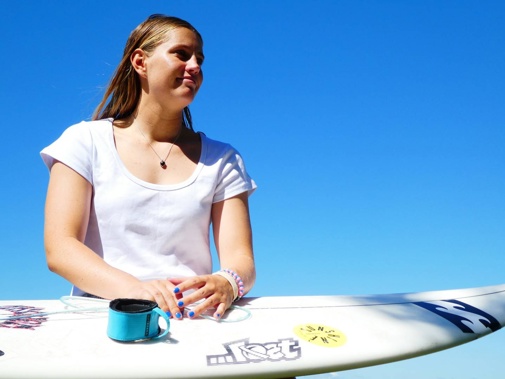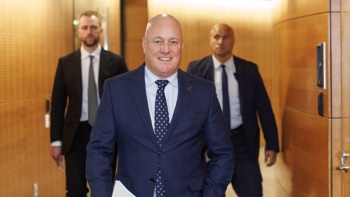
Olympian-in-waiting Saffi Vette has overcome personal tragedy, a learning disorder, school bullying and funding shortfalls to make the New Zealand team for Paris 2024. As the young surfer counts down to taking on the world’s best, she is sharing her inspirational journey with schoolkids in the hope it will motivate them to dream big. Neil Reid reports.
School wasn’t Saffi Vette’s favourite place when she was growing up.
But the 21-year-old went back during preparation for the Paris Olympics, where she will compete in the women’s surfing event, at Teahupo’o in Tahiti.
Instead of going into Gisborne classrooms giving out exercise books and pens, Vette spoke from the heart about her incredible non-sporting life triumphs, sharing her story in the hope it would inspire kids to never give up.
/cloudfront-ap-southeast-2.images.arcpublishing.com/nzme/DWDDZAW5AZDORC44T2TCHZUOD4.JPG)
She has had plenty of heartbreak, in losing her father and surfing mentor to cancer, being bullied for her sporting ability, her struggles with school including feeling “dumb” after being diagnosed with dyslexia, and a lack of funding that could have curtailed her Olympic qualification dream.
The latter saw former All Black Andy Jefferd – a friend of Vette’s late father – throw his weight behind a fundraising drive in Gisborne.
Local company Pultron Composites contributed, and in return asked Vette to visit local schools to tell them how “all the hard work and sacrifices you have made will always pay off”.
“That message is universal; whether it is academic, music, sport or general life,” Vette told the Herald.
“Whatever is challenging you, there will be a light at the end of the tunnel.
/cloudfront-ap-southeast-2.images.arcpublishing.com/nzme/6GI4W2GF6VBE5LLM5RYM3G7GM4.JPG)
“I have been to around 13 schools so far, telling them how I started, about how loss has turned me into a better athlete and person – someone who is stronger, more determined and resilient – [and] how I have turned the challenges I have faced into a positive.
“I don’t want kids to think, ‘Oh, life is shit’. Sure, you are going to go through shitty times, but things will improve. Spreading awareness around that is super important.”
Vette said she felt “privileged” to have the opportunity to share her story; the positive feedback from students had been touching.
“Even if it is just one person who I can change their perspective on life, it feels like I have made a difference.
“I don’t consider myself a famous athlete or person, but I would just like to make some sort of change to someone’s life.”
/cloudfront-ap-southeast-2.images.arcpublishing.com/nzme/QJOJZZUHYJEOTOL3OAINTNYAXE.JPG)
Losing Dad ‘very hard to come to terms with’
Vette suffered plenty of disappointment in the water on her way to qualification for Paris 2024.
But no sporting heartache could come close to the deep pain she endured in September 2020 when her beloved dad Andy Vette died from cancer.
Vette was a member of the Gisborne Boardriders Club, a board member of Surfing NZ and a role model and mentor for countless young surfers, including his daughter and her brother Finn.
When the nation went into Covid-19 lockdown, then-teenaged Saffi opted out of surfing overseas so she could stay with her ailing father.
/cloudfront-ap-southeast-2.images.arcpublishing.com/nzme/US7TZUCUJJH3VA45UYIZUNW5DA.JPG)
“He wasn’t just my dad. He was also my coach, my mentor ... he was my life mentor pretty much,” Vette said.
“I was lucky enough to get 18 years of him.
“The knowledge I gained from my dad is something I definitely took for granted. I didn’t know how good I had it until I lost him. Losing something that was so important was very hard to come to terms with.”
More than three years have passed since Andy’s death, but Vette takes him “everywhere I go”.
/cloudfront-ap-southeast-2.images.arcpublishing.com/nzme/R2X45W2DYVHV5DSO2F2LUK4V2A.JPG)
His photo is the screensaver on her phone and she sometimes takes a “taonga” that Andy used to wear, with her to surfing competitions overseas.
“I carry him with me everywhere, which is something very special,” she said.
“I have saved messages that I got from him which I look back on. Even just looking back on those messages ... it keeps me motivated and keeps me trying my hardest.”
‘I thought I was dumb, I thought I was stupid’
Vette was already a budding surfer with high hopes when she started high school in Gisborne.
But while her hard work in the water was paying off in youth competitions, her efforts in the classroom weren’t transforming into scholastic achievement, no matter how hard she tried.
“They say that people with dyslexia don’t take the main highway, they take the back roads to get to their destination,” Vette said.
“Although I was giving it more attention than my peers, giving it 110 per cent, I was only getting 50 per cent out of what I was learning. It was really unrewarding and I got to the point where I was so upset and frustrated going to school that I didn’t want to be there anymore.
“I went through countless times crying to my mum, how I didn’t want to go to school.”
Tests carried out three years into her secondary schooling showed Vette had dyslexia.
/cloudfront-ap-southeast-2.images.arcpublishing.com/nzme/JS5MCZSZVJDWVPPSE6RQ2EIUKU.JPG)
The condition makes it hard to read, write or do work involving numbers.
The Dyslexia Foundation of New Zealand says dyslexia affects an estimated one in 10 New Zealanders, including about 70,000 school children.
“Dyslexia’s greatest difficulty is self-esteem – it only becomes a disability if not appropriately addressed. On the flipside, dyslexia can deliver great creative gifts, innovation and entrepreneurship,” the foundation said.
It took time for Vette to come to terms with her diagnosis, saying, “I thought I was dumb, I thought I was stupid”.
That feeling was magnified post-diagnosis whenever teachers asked her during lessons: “Saffi, have you got it? Have you got the information yet?”.
She has since embraced dyslexia and how she thinks “differently, outside the box” compared to her peers.
That includes being incredibly creative.
“It all pays off in the long run. I want to do things my own way, do emails my own way, do my mission statement my own way ... whatever I do, I want to make it colourful and make sure I personally understand it.”
Vette transferred to correspondence school in Year 12 and completed part of Year 13 until Andy was diagnosed with cancer.
“School wasn’t for me, that’s okay as it is not for everybody,” she said.
“I decided to drop out of Year 13 pretty much and just focus on something that I was good at, and that was surfing.”
/cloudfront-ap-southeast-2.images.arcpublishing.com/nzme/4S6VZYGJTBGJ3NPZJARLZSU5RE.JPG)
One of Vette’s strengths at school – her passion and excellence in sports – was also a negative experience at times as schoolgirls bullied her for it.
“I knew from a really young age that I wanted to be involved in sport and I wanted to go to the Olympics,” she said.
“It didn’t matter what I was doing, whether it was athletics, rugby or surf lifesaving ... I was quite good at it naturally.
“And I did get bullied for that which sucked. [It was] mostly verbal ... it was more like a ‘mean girl’ thing.
“But I knew my strengths, and they were outside of the classroom. That was sport.”
Her love for her family and surfing – the latter an “indescribable” passion - got her through the tough times.
“I did a lot of sport growing up, but I think just being out in the ocean with my family and my friends, and being competitive out there, was so enjoyable,” she said.
“I just always loved the unpredictability of the ocean and I wanted to push myself against something that is bigger than me. There is so much energy and power to the ocean.”
‘I am so grateful’
New Zealand Olympic history is packed with athletes who faced adversity in qualifying and competing.
That applies to Vette – both in her path to Paris 2024 and what awaits her at Teahupo’o.
The venue for the sport’s second Olympic competition is a break which, until 2022, had been scrubbed from the women’s world tour for 16 years due to safety concerns.
Vette said despite it being “one of the most dangerous waves on the planet,” she was ready to “learn how the wave works and push myself over the ledge”.
/cloudfront-ap-southeast-2.images.arcpublishing.com/nzme/Y7TBB6NFWRCZZPMWFWIICNWXII.JPG)
“It’s really heavy and it is scary ... it is pretty damn terrifying to be honest.
“But that is what makes it even more special because you are pushing yourself outside of your comfort zone.”
Given the location in French Polynesia, Teahupo’o will set a new record for being the venue furthest away – a massive 15,771km – from a Games host city.
With limited infrastructure around the island village, a 103-room cruise ship will be transformed into a floating Olympic village for competitors.
When Vette checks in, proudly representing New Zealand on sport’s biggest stage won’t be the only thing on her mind; she’ll also be thinking of all the people who helped get her there.
That includes individuals and businesses from the Gisborne region who backed her after Jefferd raised awareness about her financial plight.
/cloudfront-ap-southeast-2.images.arcpublishing.com/nzme/YQHMEKAMFFA5HGO6YCUWB6SGDU.JPG)
First, he joined Vette’s mother and several other locals to raise money to help fund her 2021 and 2022 campaigns.
Another fundraising drive in late 2023 aimed to cover expenses in the build-up to the Olympics.
With High Performance Sport NZ’s funding criteria weighted heavily towards medal contenders, Vette faced a huge funding shortfall.
She also didn’t have access to the high-performance training centre – which has nutritionists, trainers and a sports gym available – saying it was “kind of ridiculous that an Olympic-qualified athlete [can’t] go in there”.
“I am so lucky to have Andy in my corner, and the whole of the Gisborne community as well,” Vette said.
“As an ex-All Black he just thought it was ridiculous that you are representing New Zealand and you can’t get a single bit of funding from your national body or High Performance Sport.
“After my dad passed away, obviously it is harder for my mum to support two kids with just a single income. Andy said, ‘We need to help Saffi out, get her some help to achieve her goals’.”
/cloudfront-ap-southeast-2.images.arcpublishing.com/nzme/V5EHPW6J4VFTTCNRV5O4RCXF6E.JPG)
Jefferd said backing Vette had been an easy decision.
During his rugby days, he was an inspiration on the East Coast after becoming the only player to make his All Black debut while playing for the province.
He believed Vette was a huge inspiration, especially for kids, highlighting how tough work, courage and determination could pay off.
“I’ve always backed Saffi because she is a talented athlete, but more importantly she is passionate about surfing, hard-working and always trying to improve.
“She’s very humble and always keen to help younger up-and-coming surfers.
“And she’s had a difficult journey losing her dad. But she has inspired many schoolchildren in Tairāwhiti when sharing her story with them.”
Several months out from the Olympic surfing competition – which runs from July 27-30 – Saffi said she felt “no pressure” about competing.
Few considered her a medal possibility – something she hoped would change in future Olympics.
/cloudfront-ap-southeast-2.images.arcpublishing.com/nzme/P77OXID7QBAQ5DFG2TADNWG5ZY.JPG)
But Vette was adamant she wasn’t going to turn up at Teahupo’o just to make the numbers up. She was also determined that no matter where she ends up with surfing, encouraging local kids will be a priority when she returns home.
“I want to be the best version of myself that I can be, give back and be an inspiring role model for other kids,” she said.
“I want to be approachable, be nice and give back to whoever it is that follows my journey.”
Neil Reid is a Napier-based senior reporter who covers general news, features and sport. He joined the Herald in 2014 and has 30 years of newsroom experience. He travelled to Sydney and Athens to cover the 2000 and 2004 Olympic Games.
Take your Radio, Podcasts and Music with you









